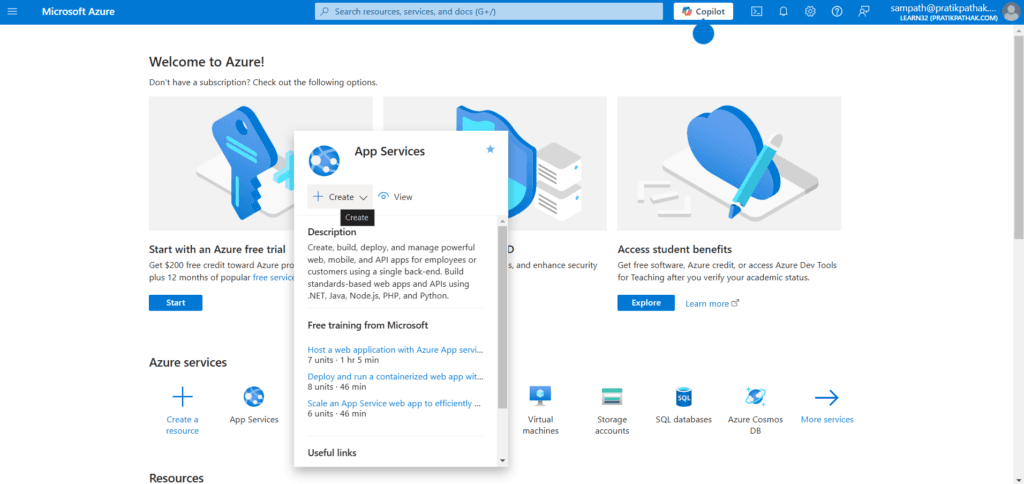Azure App Service is packed with features that simplify your development journey with automated updates, flexible deployment options (GitHub, Docker Hub, Azure DevOps), and global hosting across Microsoft’s data centers. With built-in compliance to standards like ISO, SOC, and PCI, it ensures security and scalability for your applications, making it the ideal platform for modern development.
Introduction to Azure App Service
Azure App Service is a complete managed platform-as-a-service (PaaS) offering from Microsoft designed to simplify the complexity of hosting web applications, REST APIs, and mobile backends.
It offers first-class support for multiple programming languages and frameworks, including .NET, Java, Python, Node.js, and more. This allows developers to focus on creating great software without worrying about infrastructure management.
Whether you’re deploying a website for a small business or a global enterprise, Azure App Service scales seamlessly to meet all customer needs.
Why Choose Azure App Service?
Azure App Service stands out due to its rich feature set and unparalleled flexibility. One of its most compelling features is automated platform management, which handles updates for the underlying operating system and application frameworks. This means you spend less time worrying about patches and more time building your application.
App Service also supports containerization, where developers can deploy custom Linux or Windows containers. This makes running applications that require a specific runtime environment or configuration easy.
From a security point of view, Azure adheres to international standards like ISO, SOC, and PCI, which helps to keep businesses handling sensitive information at ease.
What Makes Azure App Service Special?
It is an HTTP-based platform that can fit so many different types of applications. Developers can use this to host traditional web applications, build modern serverless APIs, or create strong mobile backends. With Azure App Service, developers could work with a vast language as it is flexible. A team can work on applications using technologies they already use.
Azure also integrates deeply with DevOps pipelines, enabling continuous integration and deployment from platforms like Azure DevOps, GitHub, and Docker Hub. With App Service, you can deploy in seconds, ensuring your updates reach users faster.
Hosting Options: App Service Plans vs. App Service Environments
Azure App Service offers two main hosting options to meet the various needs of applications: App Service Plans and App Service Environments (ASE). These hosting options determine the compute resources and levels of isolation available to your applications
App Service Plans
It will decide your application’s compute resources in terms of virtual machines allocated to it. Some considerations of App Service Plan are a region, pricing tier, and scale type. Depending on the necessity of your application, there are several tiers:
- Shared Compute: Suitable for development, testing, and training because it is economical; not preferable for production workloads.
- Dedicated Compute: Three tiers: Basic, Standard, and Premium – increases performance, scaling, and additional features.
- Isolated Tier: For enterprise applications that have particularly strong compliance requirements it is available, providing the highest isolation of network and compute resources on a Virtual Network (VNet).
App Service Environments (ASE)
For applications requiring enhanced security and full isolation, ASE provides a premium hosting environment. It operates within your Azure Virtual Network, offering total control over network traffic and robust scalability (up to 100 instances per plan). This is ideal for industries like finance, healthcare, and government where compliance and data privacy are critical.
Choose the hosting option correctly to ensure your application’s infrastructure aligns with performance, scalability, and security requirements.
Deployment Models: Select Your Model
Once you’ve chosen your hosting option, Azure App Service offers two deployment models to suit different scenarios:
Public Multitenant Service
This shared hosting environment uses resources across multiple tenants and is, therefore, a cost-effective solution for most applications. It is ideal for businesses with moderate traffic and predictable workloads. Apps under this model can scale up to 30 instances, providing flexibility without the need for dedicated infrastructure.
App Service Environment (ASE) v3
For applications that require more isolation and control, ASE v3 provides a fully dedicated hosting environment. It ensures that your application is completely unaffected by other Azure tenants and provides advanced security as it runs within your VNet. With scalability up to 100 instances, ASE v3 is well-suited for mission-critical applications in industries like healthcare and finance.
How to Deploy Different Applications on Azure App Service
Creating an App Service

Choose Preferred Model
Deploy ASP.NET Applications
Select .NET Framework or .NET Core: Choose the appropriate runtime (either .NET Framework for Windows or .NET Core for Linux).
Publish from Visual Studio: Use Visual Studio to publish your application directly to Azure. You can also use Azure DevOps for CI/CD.
Configure Application Settings: Set up any necessary app settings (e.g., connection strings, environment variables) via the Azure portal.
Test the Application: Once deployed, verify your app is running smoothly by visiting the provided URL.
Deploy Node.js Applications
Push Code to GitHub or Azure Repos: Push your application code to a Git repository (e.g., GitHub, Azure Repos).
Set up Continuous Deployment: Configure Continuous Deployment (CD) through GitHub Actions or Azure DevOps pipelines.
Configure Environment Variables: Set any required environment variables like database URLs or API keys in the Azure portal.
Deploy and Test: After deployment, ensure your app works correctly by accessing the public URL.
Deploy PHP Applications
Prepare Code for Deployment: Upload your PHP code via Git, FTP, or Azure DevOps.
Connect to MySQL Database: If needed, configure and connect to Azure Database for MySQL.
Set Application Settings: Define any required environment variables or app settings in the Azure portal.
Deploy and Monitor: After deployment, monitor app performance and troubleshoot any issues using Azure Monitor.
Deploy WordPress Applications
Set Up MySQL Database: Azure will automatically provision a MySQL database for your WordPress site.
Configure WordPress: Complete the WordPress setup (e.g., admin credentials) via the browser after deployment.
Customize and Upload Content: Customize the theme and upload your content through the WordPress admin panel.
Scale and Secure: Configure auto-scaling based on traffic and secure your site with Azure’s security features.
Deploy Java Applications
Push Code to GitHub or Azure Repos: Push your Java application code to a Git repository.
Set Up Continuous Deployment: Configure a CI/CD pipeline using Azure DevOps or GitHub Actions to automate deployments.
Configure Java Runtime: Choose the correct Java version and any specific settings needed for your app.
Test the Application: Once deployed, test the app by accessing it via the provided URL.
Deploy Python Applications
Push Code to GitHub or Azure Repos: Push your Python code to a Git repository like GitHub.
Configure Database and Storage: Set up connections to databases (e.g., Azure Database for PostgreSQL or MySQL) or Azure Blob Storage.
Set Up Continuous Deployment: Use Azure DevOps or GitHub Actions for automated deployment.
Deploy and Monitor: Once the application is deployed, monitor it using Azure’s built-in diagnostic tools.
Scaling in Azure App Service
Azure App Service offers both vertical and horizontal scaling to meet your application needs.
Vertical scaling increases the computing power of your instance (e.g., moving from small to medium for more CPU, memory, and storage).
Horizontal scaling adds more application instances to handle increased traffic, distributing workloads efficiently across multiple servers.
With autoscaling, you can define rules to automatically adjust resources, such as adding more instances when CPU usage exceeds a threshold, ensuring optimal performance and cost control.
Monitoring and Diagnostics
Azure App Service provides robust monitoring tools to track application performance and troubleshoot issues. Built-in diagnostics capture logs on errors, request tracing, and behavior, which can be stored in Azure Storage or analyzed using Azure Monitor or Application Insights for deeper insights.
Application Insights offers advanced features like transaction tracing and anomaly detection, helping you identify bottlenecks and optimize performance.
Integrated security monitoring tracks inbound and outbound traffic to ensure your application is secure and highly available.
Practical Use Cases
- Small Business Websites: Ideal for low-traffic, cost-effective hosting.
- Enterprise Applications: Designed for large-scale, compliance-focused deployments.
- Mobile Backends: Easy integration with Azure Notification Hub for push notifications.
- APIs: High-performance hosting with security and throttling via Azure API Management.
- Whether you’re building for small-scale needs or managing global operations, Azure App Service offers the scalability and tools to help your application succeed.
Conclusion
Azure App Service is a one-stop solution for modern application hosting, offering flexibility, security, and scalability. With its robust features, multiple deployment options, and seamless DevOps integration, it empowers businesses to deliver high-quality applications quickly and efficiently.
